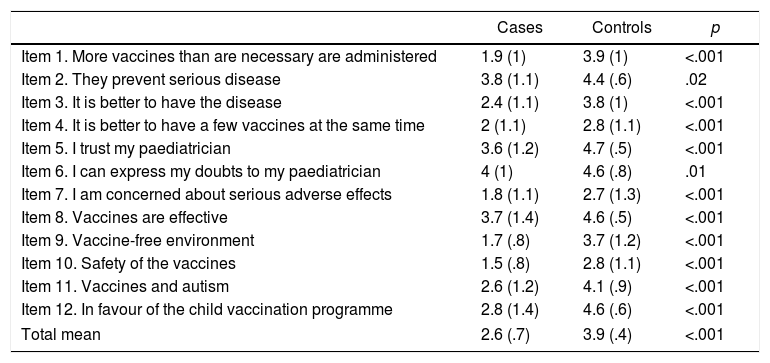Although vaccination has proven to be one of the most effective public health interventions for disease prevention, a small section of the population presents the so-called ‘vaccine hesitancy’ or vaccination doubts. It would be interesting to know the possible factors related to rejection of vaccination.
Material and methodsStudy of cases and controls in which data have been collected from children registered in the REVA programme in the province of Valladolid with explicit rejection of parents (cases), paired with children of the same age, sex and basic health area that do have been vaccinated (controls). Telephone interview was conducted to obtain sociodemographic factors and opinion on vaccination.
Results and discussionA total of 82 children were selected, of whom 30 parents agreed to take to the survey. 55% of them mention the doctor as the main source of vaccination information, which contrasts with the distrust of the detected system. Statistically significant differences in the perception of vaccination side effects between cases and controls and in the different items were observed. Statistically significant association was observed between the use of homeopathy the risk of being a case (OR=5.75, 95%CI=1.9 to 17.34).
ConclusionsAlthough the number of children not vaccinated by explicit rejection by their parents in Valladolid is very low, it is important to know the reasons for this decision and to make an approach guided by the approach of postures rather than the judgment of values towards these families.
A pesar de que la vacunación ha demostrado ser una de las intervenciones en salud pública más eficaz para la prevención de enfermedades, un pequeño sector de la población presenta el llamado «vaccine hesitancy» o dudas sobre vacunación. Resultaría interesante conocer los posibles factores relacionados con el rechazo a la vacunación.
Material y métodosEstudio de casos y controles en los que se han recogido datos de niños y niñas registrados en el programa REVA en la provincia de Valladolid con rechazo explícito de los padres (casos), emparejados con niños de su misma edad, sexo y zona básica de salud que sí han sido vacunados (controles). Se realizó entrevista telefónica para obtener factores sociodemográficos y opinión sobre vacunación.
Resultados y discusiónSe seleccionaron un total de 82 niños y niñas, de los cuales 30 padres aceptaron contestar a la encuesta. El 55% de ellos mencionan como principal fuente de información en vacunación al médico, lo que contrasta con la desconfianza hacia el sistema detectada. Se observaron diferencias estadísticamente significativas en la percepción de los efectos secundarios de la vacunación entre casos y controles y en los diferentes ítems. Se observó asociación estadísticamente significativa entre el uso de homeopatía y el riesgo de ser caso (OR=5,75, IC95%=1,9 a 17,34).
ConclusionesA pesar de que es muy bajo el número de niños no vacunados por rechazo explícito de sus progenitores en Valladolid, es importante conocer los motivos de esta decisión y hacer un abordaje guiado por el acercamiento de posturas en lugar del juicio de valores hacia estas familias.











